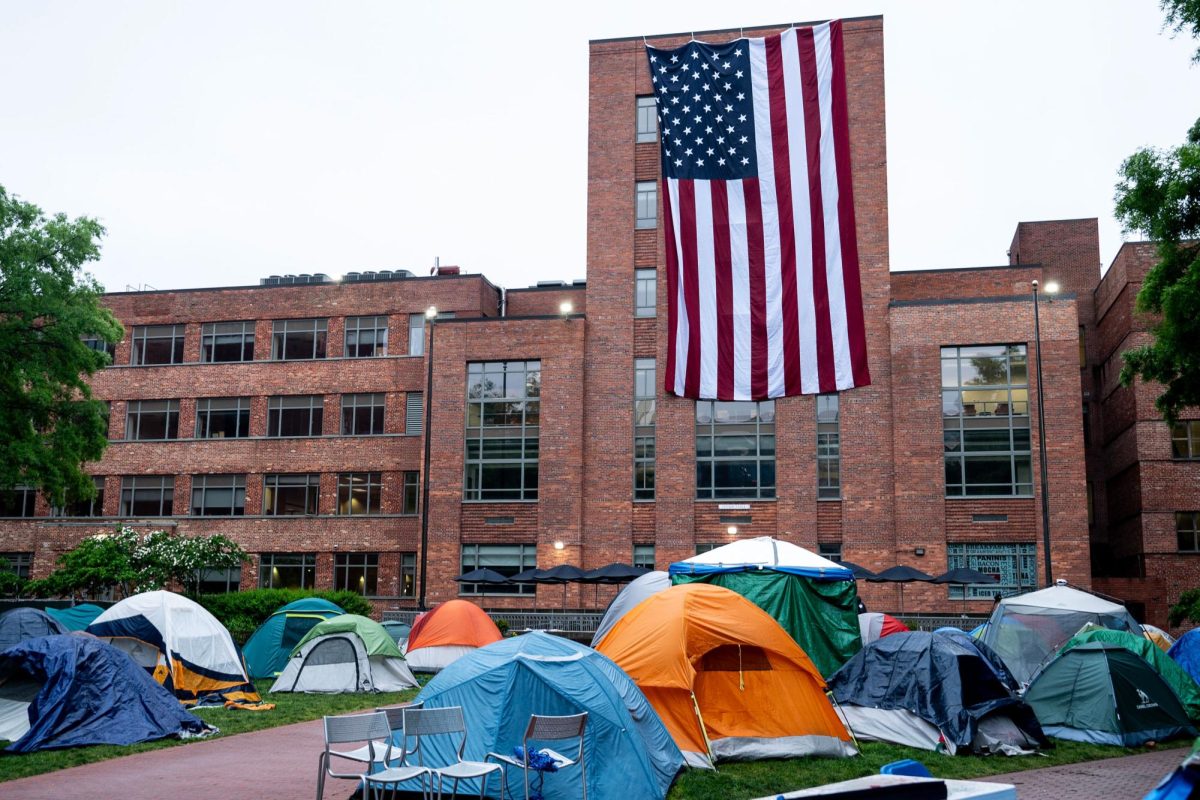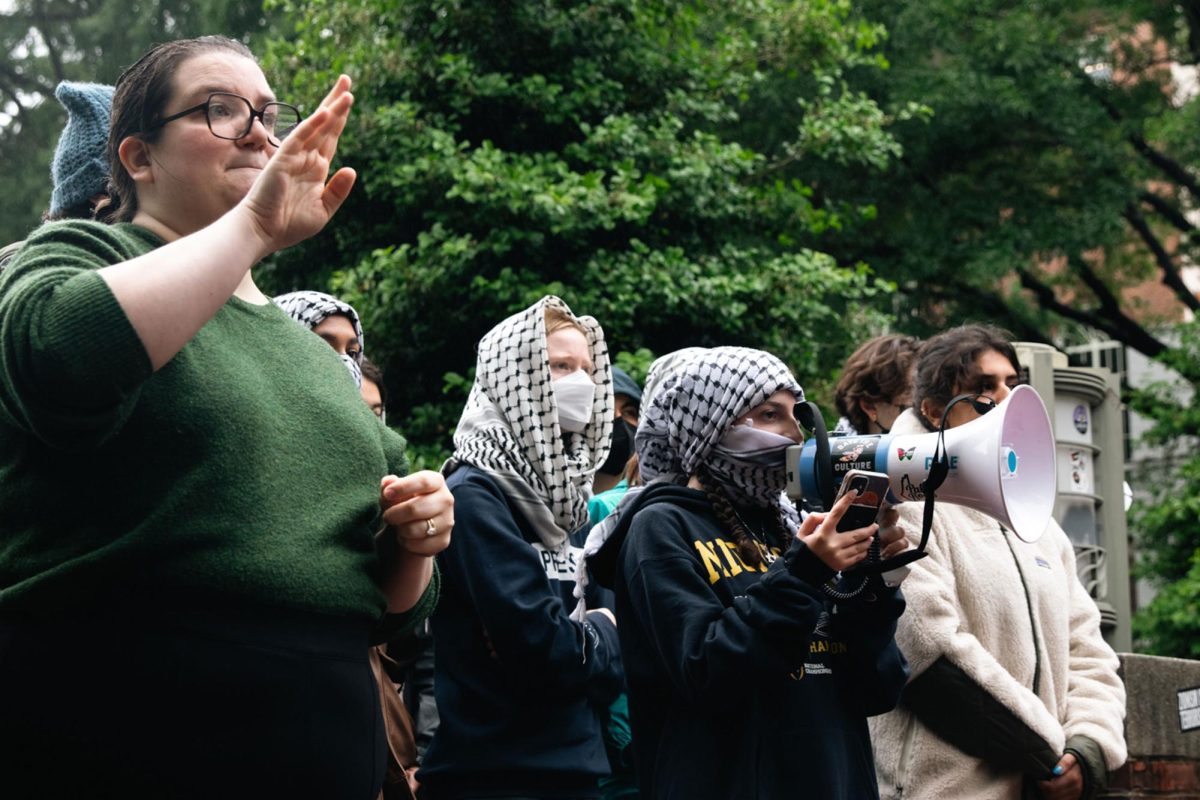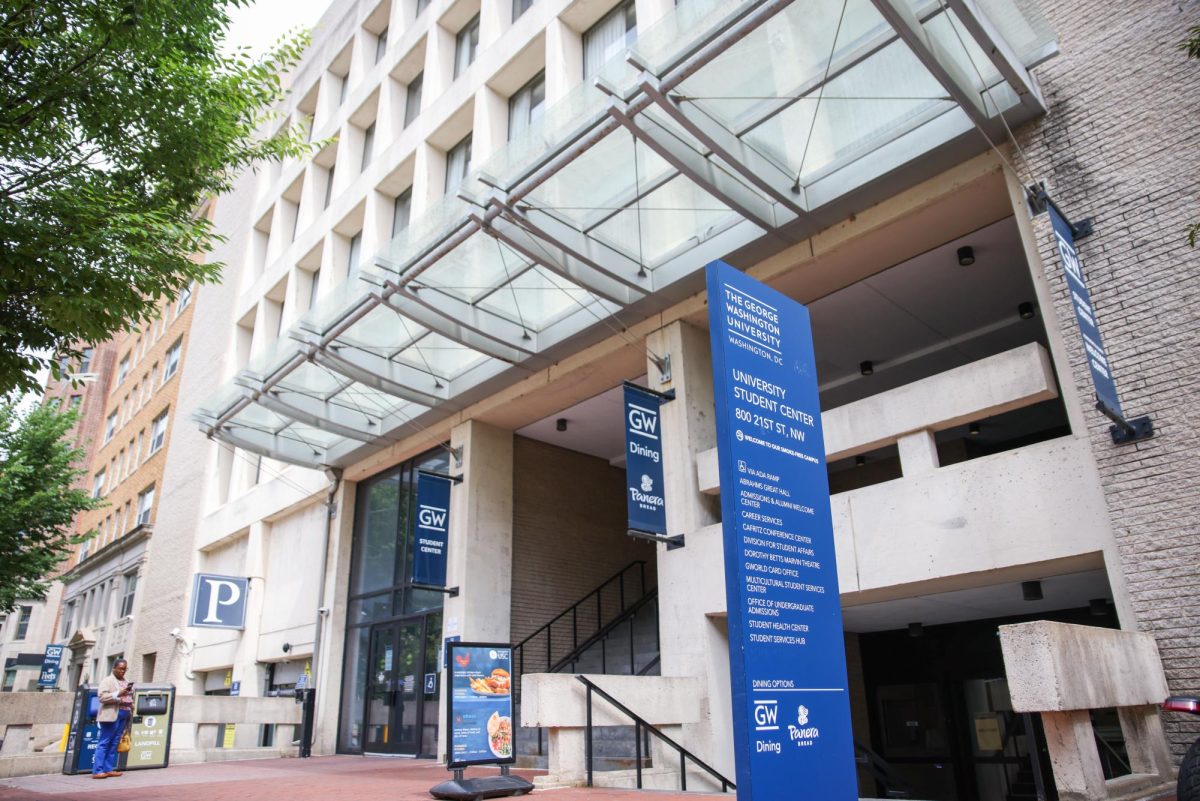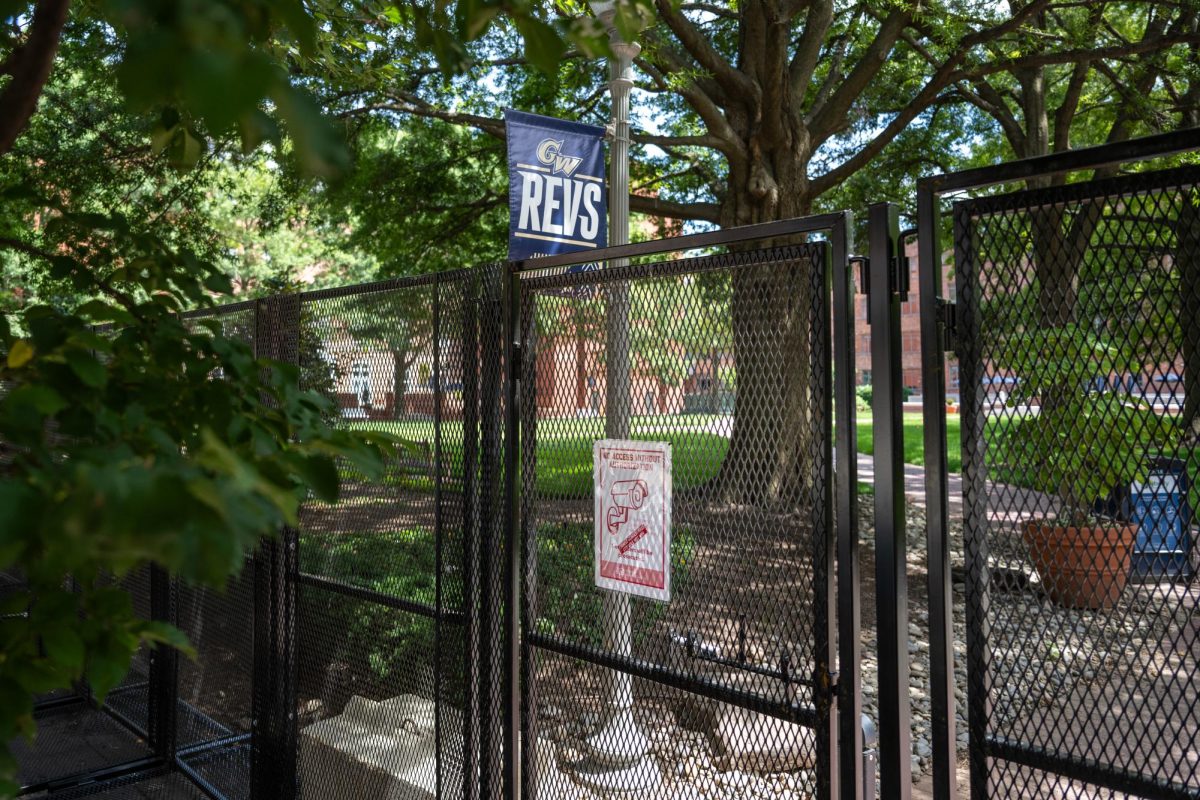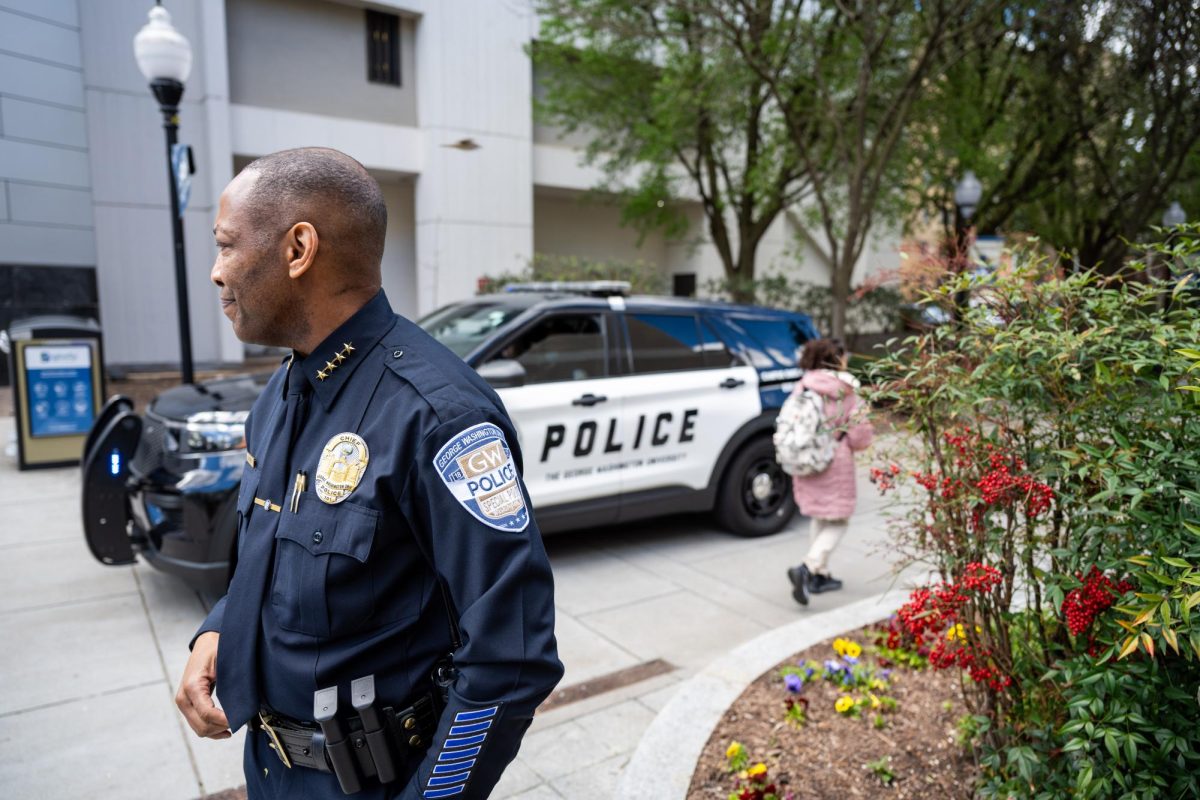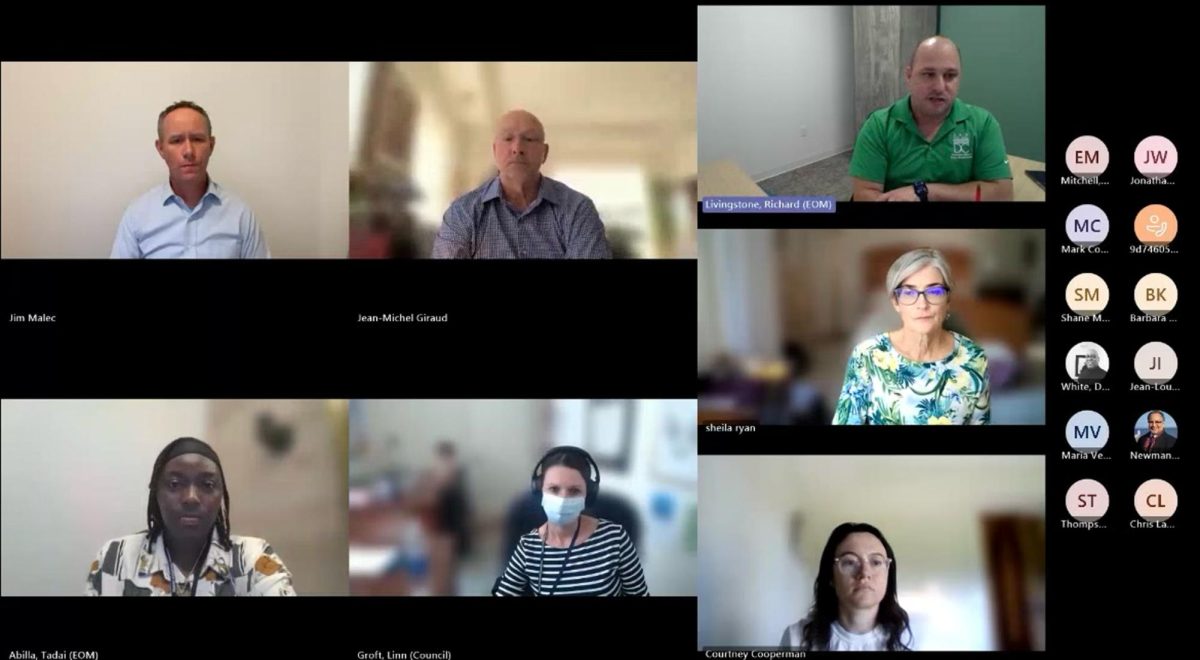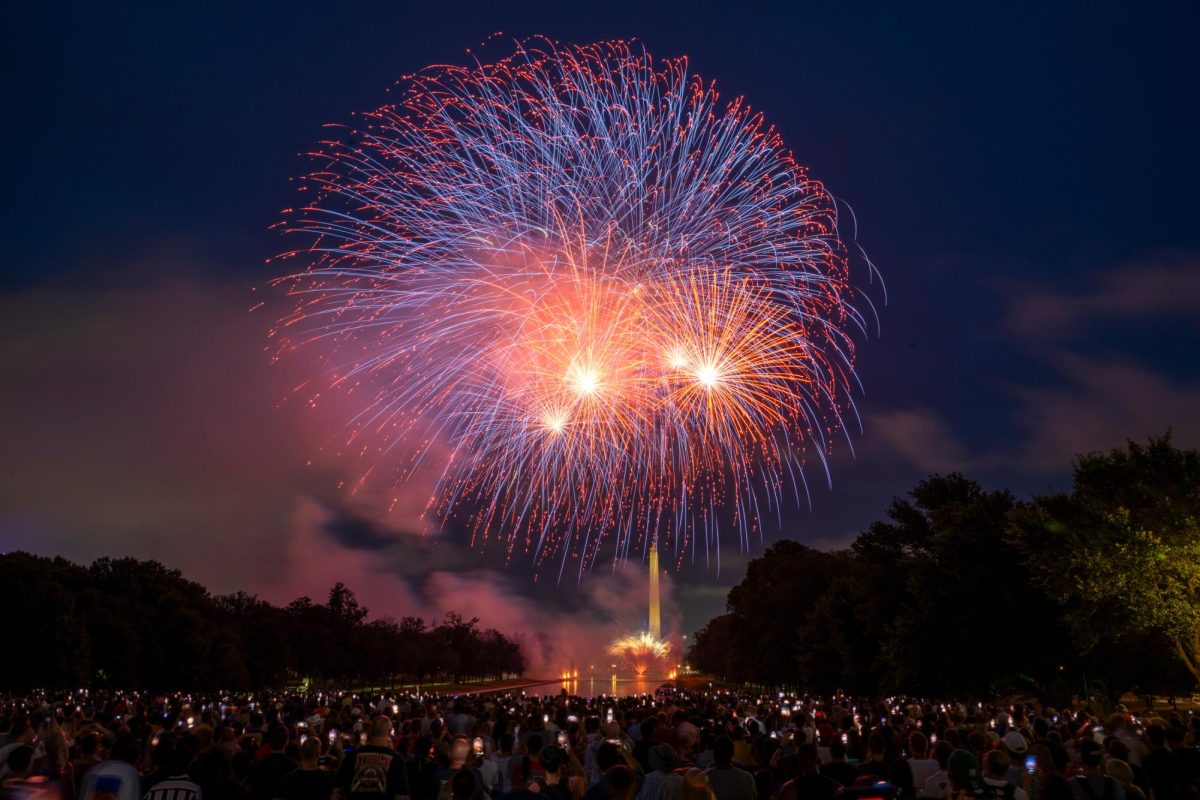Pro-Palestinian demonstrators donned ponchos and rain jackets and rain flies remained on tents as the encampment in University Yard experienced unrelenting rainfall throughout the night.
Organizers held a press conference Saturday where they said the University had formally refused to meet with protesters Friday to discuss their demands of support for pro-Palestinian student organizers and divestment from companies with ties to Israel. Organizers also claimed that an eighth student had been suspended for participating in the encampment.
A University spokesperson said officials had been in talks with students both inside and outside of U-Yard and declined to comment if officials formally rejected demonstrators’ request to sit down with officials. The spokesperson also said the University cannot comment on claims that an additional student was suspended because of “federal regulations.”
Protesters confronted former Israel Defense Forces soldier and Israeli activist Rudy Rochman on Saturday by circling around him while chanting and drumming after he entered a crowd of chanting protesters on H Street. On Saturday evening, a counterprotester tore Palestinian flags off of the George Washington statue in U-Yard.
Follow along for live updates below:

Updated: 2:58 a.m. — Protesters settle in for dry night, facing full week of final exams
The encampment had fallen silent by 2:57 a.m. and remains dry after two rainy nights. Students face the second day of final exams Monday, and the exam period will last throughout the week until Friday.
Updated: 11:10 p.m. — Organizer sprays rodent repellent
An organizer in a yellow vest sprayed a clear liquid rat repellent around the encampment at about 11:03 p.m. As temperatures rose starting last Sunday, rats began to emerge around U-Yard at night, rustling in the bushes and darting in between tents.
Updated: 10:02 p.m. — Demonstrators place sleeping bags, blankets in center of U-Yard to be cleaned
At around 9:45 p.m. an organizer announced that members of the community had offered to wash dirty sleeping bags and blankets. The organizer asked protesters to place all personal items they wanted washed in tents at the center of U-Yard.
“Who keeps us clean?” the organizer asked.
“We keep us clean,” the crowd responded.
Updated: 9:51 p.m. — Faculty sign letter challenging April 26 open letter
More than 100 faculty and staff from universities across the D.C., Maryland and Virginia area signed a letter in response to an academic freedom letter that circulated on the second day of the encampment.
The letter, which was dated May 4 and obtained by The Hatchet on Sunday night, argued that the April 26 letter’s support of the pro-Palestinian encampment makes “simplistic” and “problematic assertions” and dismisses the “antisemitic intent” of many protesters. The May 4 letter was signed by more than 100 faculty and staff from GW, Georgetown, American, Howard, George Mason and Johns Hopkins universities as well as the University of D.C., the University of Maryland, College Park, and the University of Maryland, Baltimore County.
More than 40 faculty and staff members from GW signed the letter.
Eric Arnesen, a professor of history, said in an email that he and Daniel Schwartz, a professor of history and Judaic studies, drafted the letter because they thought many claims made by the April 26 letter were objectionable and that the “full throated” support of the protests by faculty who signed the April 26 letter does not represent the majority viewpoint of GW and DMV area faculty.
The May 4 letter states that the April 26 letter does not mention the deaths of Israelis on October 7 or Hamas’ holding of hostages, which they say undermines the April 26 letter’s claim of a “clear moral compass.”
The May 4 letter also states that the signatories oppose attempts to ascribe “antisemitic intent” to all or most protesters but says there has been multiple instances of harassment, abuse and physical violence against Jewish students at GW since Oct. 7. The letter also opposes the use of police force on demonstrators, but states that the time and place rules surrounding classes and exams do not undermine “‘open and free’” expression of speech.
“Within the George Washington University encampment, for instance, signs reading ‘Students will go back home when Israelis go back to Europe, US, etc. (their real homes)’ and even ‘final solution’ appeared recently,” the letter reads.
The May 4 letter also criticizes the April 26 letter’s claim that University administrations would be on the “wrong side of history” if they stood in the way of protests, saying many signatories question the idea that an “uncritical embrace of pro-Palestinian extremism” is considered the right side of history.
“The satisfaction of claiming moral clarity must not come at the expense of ignoring the pain and justified grievances of both Palestinians and Israelis,” the letter reads.
Updated: 7:56 p.m. — DMV Coalition condemns University administrators’ handling of demonstrations in press release
The DMV Student Coalition for Justice in Palestine posted a press release on Instagram Sunday condemning administrators’ refusal to meet with organizers and decision to hang a huge American flag off of Lisner Hall.
The release states that University President Ellen Granberg “evaded requests” for dialogue from protesters and that the Metropolitan Police Department used “physical and psychological tactics of repression” when they erected barricades around the encampment. The release states that Granberg refused to cooperate with the demonstrators’ “negotiations team” to schedule a meeting, but set up a meeting with members of Congress last week.
Several Republican members of the House of Representatives Oversight Committee met with administrators including Granberg and Provost Chris Bracey on Wednesday at 1922 F Street.
“While ignoring students, the administration welcomed a last-minute request to meet with zionist members of Congress on campus earlier this week,” the letter reads.
The release states that the “only material harm” Jewish students have faced on campus has come from University administrators like Provost Chris Bracey.
“This includes our own Provost and Executive Vice President for Academic Affairs Christopher Bracey physically assaulting a female Jewish student during his fit of rage in the middle of the night at our encampment,” the letter reads.
Bracey walked through U-Yard last Sunday night after demonstrators breached the metal barricades, and appeared to grab the phone camera of a student recording him. The student coalition posted a video on Instagram an hour later that showed Bracey walking away from demonstrators.
The release states that protesters hung the Palestinian flag in U-Yard to create “visibility” for those fighting for the liberation of Palestine and that administrators disrespected this effort by hanging a huge American flag from Lisner Hall.
The University hung a giant American flag from the roof of Lisner Hall on Friday afternoon after GWPD officers cut ropes on the two flagpoles in front of the building at around 3:30 a.m. A GW Media Relations statement to community members Thursday night condemned demonstrators’ decision to use the flagpole to hoist a Palestinian flag as an “aggressive act of lawlessness.”
“The reactionary display of a US flag overlooking this protest boldly declares what we have always known: the stars and stripes are a banner of settler-colonial genocide that this administration wears with pride,” the letter reads.
Updated: 7:07 p.m. — Organizers hold collective life teach in
At around 5:45 p.m. two organizers spoke to about 30 protesters about the value of participating in the encampment and embracing “simple living and collective life.”
“They want us to look out for only ourselves and be dependent on the capitalist system, so we turned a blind eye to the atrocities that they’re committing,” an organizer said. “Palestinians continue to be bombed and starved, we need to be steadfast in our solidarity more than ever, embracing simple living and collective life.”
The organizers started the talk by asking the audience what they thought simple living and collective life meant. One audience member said collective life looks like everyone in the community taking care of each other.
“The definition that we have written down for simple living is not just using and taking resources in a minimalistic way but really structuring our life and our resources in a way that serves the movement and communities around us,” the organizer said.
The organizers said capitalism defines the “collective” only as people within the same social class when it should include everyone.
“In this way collective life acknowledges different identities, disabilities and life circumstances,” the organizer said.
The organizers then listed three actions that go against collective living: establishing “deservingness hierarchies” like eligibility requirements to get aid, leaving room for “saviorism” and co-optation.
“We’re not doing this work for each other to make us feel good or feel like good people,” the organizer said. “We’re doing this because we care about each other.”
The organizer then said collective life is how people in Palestine are living.
“We see abroad in Palestine all the different ways that they are challenging imperialist structures is what’s keeping them alive and so we want to bring that same attitude into the encampments,” the organizer said.
Another organizer then talked about Marxist theories of consumerism and capitalism. They said the bourgeoisie class, in order to be successful, needs the masses to keep buying goods to continue the “cycle of capitalism.”
The organizer then said one thing the “proletariat” or working class can do to stop capitalism is to be an ethical consumer.
“So do I need this product, was this product ethically made,” the organizer asked. “Do I support the conditions that this worker had to live under in order to make this product for me?”
The organizers then held a short discussion period, where demonstrators discussed in small groups how they can embrace simple living in their own lives.
One group discussed how the collective lifestyle in the encampment showed how possible it is to live simply in daily life.
“This is really all I need,” one demonstrator said about their life in the encampment.
Updated 4:11 p.m. — Organizers hold press conference
Encampment organizers reiterated their demands and their focus on Gaza in a press conference on Sunday at about 2 p.m.
Organizers reiterated their demand for the University to divest from companies with ties to Israel and support pro-Palestinian student organizers. An organizer recognized Sunday as Holocaust Remembrance Day.
“As a Jewish student, I think it’s important for us to recognize the history of my people in fighting against oppression and fighting for liberation,” the organizer said. “So let us make sure that we will no longer be complicit in genocide against anyone.”
Organizers during said negotiations with University officials have been an “ongoing process” and repeated their claim that University President Ellen Granberg has refused to meet with them. Granberg said in a statement Sunday that officials have conducted “regular and sustained dialogues” with GW students connected to the camp.
“Right now, we are here, we are steadfast in our demands,” an organizer said. “The University has not yet been responsive, so we will continue to be here and continue to fight for our demands.”
Organizers declined to state how many demonstrators remain in the encampment, citing concern for demonstrators’ safety. An organizer said they have waterproofed tents and received food and waterproofing supplies from community members.
“The conditions that we may face here are absolutely nothing compared to the conditions that people are facing in Gaza right now,” an organizer said. “We have functional tents, we have waterproof tents. People in Gaza do not.”
Updated 3:53 p.m. — Granberg says GW unable to end ‘illegal’ protest alone
University President Ellen Granberg said GW is unequipped to manage the pro-Palestinian encampment in University Yard and called on GW’s partners, including D.C. officials, for their “full support” on Sunday.
In the message to community members at about 2:30 p.m., Granberg said all of the University’s efforts to end the encampment or deter protesters from escalation have failed, including discussions with students, the assistance of local police and administrative consequences. She said the encampment is “potentially dangerous” and no longer qualifies as a student demonstration.
The message, which doesn’t explicitly ask D.C. officials to clear the encampment, nonetheless calls the protest illegal and places further pressure on the Metropolitan Police Department to clear the demonstration.
“However, when protesters overrun barriers established to protect the community, vandalize a university statue and flag, surround and intimidate GW students with antisemitic images and hateful rhetoric, chase people out of a public yard based on their perceived beliefs, and ignore, degrade, and push GW Police Officers and university maintenance staff, the protest ceases to be peaceful or productive,” Granberg said in the statement.
Read the full story here.
Updated 11:35 a.m. — Community meeting
Just after 11 a.m., organizers held a community meeting with roughly 50 demonstrators to provide updates on negotiations with officials and other encampment matters.
Organizers started the meeting with updates on the 32 Palestinians that have been killed and 41 Palestinians injured within the past 24 hours in Gaza. Organizers said they would name each tent in the encampment after a Palestinian village.
They also provided updates on the “terrifying” arrests at the University of Virginia’s encampment, after police took at least 25 protesters into custody Saturday and cleared the encampment, telling demonstrators they each have a role in “holding down” the University Yard encampment.
“I know it’s finals. I know the weather is far from ideal for being outside,” an organizer said. “But we have strength in numbers.”
An organizer provided an update from the encampment’s negotiation team, reiterating that officials have allegedly declined requests from protesters to meet and negotiate their demands.
A University spokesperson said Saturday that officials have communicated with protesters at the encampment and elsewhere. The spokesperson declined to comment on whether officials had formally rejected organizers’ requests to meet.
Organizers told the crowd they can help patch leaking tents with tape and additional tarps.
“Hot or cold, rain or shine, we show up for Palestine,” protesters chanted.
Some protesters chanted in Arabic and clapped after the meeting concluded.
Updated 10:32 a.m. — Rain beats down on encampment
Throughout the morning, few demonstrators have left their tents as rain continues to fall on the encampment and temperatures remain in the low 60s. Some protesters gather under the food tents for breakfast while others sit bundled in coats under tarps.
Around 9 a.m., organizers began to play music and walk through the encampment with a megaphone to wake up demonstrators.
“Rise and shine Revolutionaries,” an organizer called out.
Many demonstrators started their morning by draining the water built up on top of their tents and tarps from last night’s downpours.
Updated 9:13 a.m. — Day 11 encampment schedule
Organizers have displayed the schedule for today’s programming on a whiteboard at the center of the encampment Sunday morning.
- At 11 a.m., a community meeting.
- At 11:30 a.m., collective study.
- At 1:05 p.m., Dhuhr prayer and lunch.
- At 1:30 p.m., a Gaza teach-in.
- At 3:30 p.m., Tatreez circle, a form of Palestinian embroidery.
- At 5:30 p.m., Asr prayer.
- At 6:30 p.m., Simple Living and Collective Life.
- At 7:30 p.m., dinner.
- At 8:05 p.m., Maghrib prayer and Khatira.
- At 9:45 p.m., Isha prayer.
Updated 6:19 a.m. — GWPD Officers return outside of Corcoran Hall
Four GW Police Department officers huddle under the doorway to Corcoran Hall. Officers returned to their post outside of Corcoran Hall at about 6 a.m. after not being present outside the hall overnight.


